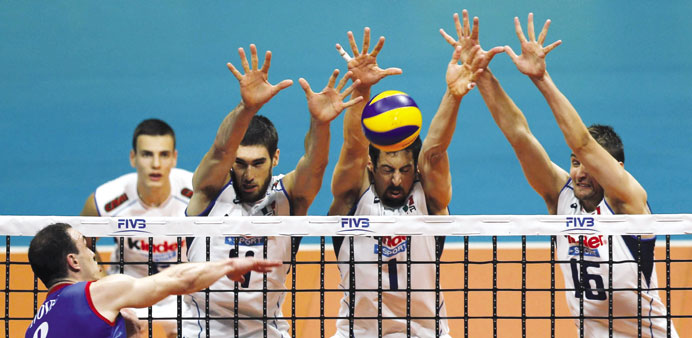The FIVB Volleyball World League final is being held in Rio de Janeiro as a test event for the 2016 Olympics. (Reuters)
AFP/Rio de Janeiro
Stadium ready? Check. Equipment working, check. Crowd dancing, double check. An international volleyball event testing Rio de Janeiro’s readiness to host the 2016 Olympics got off to a flawless start on Wednesday.
The World League finals feature the top six volleyball teams this week, with Wednesday’s opening game seeing France beat Brazil in four sets at Rio de Janeiro’s famous Maracana stadium complex. For Brazil’s players—not just on home ground but playing one of their main national sports—the loss was disappointing.
However for organisers of the Summer Games, which open in Rio in August 2016, things went perfectly. With the Olympics only just over a year away, volleyball was the first of 44 events running up until May that will test the city’s infrastructure and organization in real world conditions.
The action took place in the Maracanazinho arena, adjacent to the legendary Maracana football stadium where the Games’ opening ceremony will take place. Giovane Gavio, a gold medal-winning former member of the Brazilian Olympic team and now in charge of next year’s volleyball events, told AFP that the day passed off “very positively.” “So far, all is well,” he said. “The Maracanazinho has been undergoing refurbishment and it is meeting expectations.”
The playing area appeared to work smoothly, the big replay screens had no glitches, and apart from the volume being turned to ear-splitting levels for the opening second of the French national anthem, the public address system worked perfectly.
This being Brazil, the crowd needed little encouragement. Organizers said about 10,000 people attended. The stands appeared three quarters full, almost exclusively with Brazil supporters wearing the yellow colours of the national team or, in one section, the blue of one of the sponsors, Nivea skin cream.
Fans danced and chanted with all the stamina of Rio carnival veterans and when it came to trying to put off French players with intense whistling, they were just as enthusiastic. French player Benjamin Toniutti spoke of the “difficult atmosphere” for a visiting side. However, the partisan crowd was all part of the fun, said another French player, Franck Lafitte.
“That helps us,” he said. “The atmosphere was great, with people dancing in the stands. It was superb.”
Rio de Janeiro, one of the world’s most picturesque cities but also one dealing with areas of intense poverty and street violence, sounds confident about being ready to host the planet’s biggest sporting occasion.
Today, Mayor Eduardo Paes was set to announce riding and triathlon test events. The city already took part in Brazil’s hosting of the football World Cup last year. However, the Olympics task is significantly more complex.
The Rio2016 organizing committee says that building work is on schedule. The less visible but no less tricky issues like security and transport won’t be ready for testing until much later.
At the Maracanazinho there were minor signs of teething problems. For example, the press credentialing room was set up in a hallway for toilets and overwhelmed staff had to give up trying to issue the professional-looking badges, because of printing difficulties. But the enthusiasm of the volunteers, on which all Olympics depend heavily, promised to make up for hiccups.
During the volleyball event, a man dressed in a giant foam Nivea bottle tripped and fell next to the arena. For a moment he lay as helplessly as an upturned beetle, his shoes and hands waggling uselessly outside the blue tube. But Rio’s Olympics team was ready: within seconds, no less than six volunteers and two smartly uniformed policemen had rushed to put the Nivea man back on his feet.

